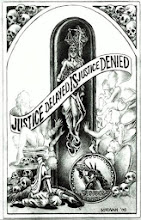
Perjured jurors
By Alan Keyes
August 10, 2005
In its discussion of the meaning of "perjury," the Oxford English dictionary notes that "in legal usage, perjury was first the offence of jurors in giving a willfully false verdict, they being sworn to give a true verdict according to their knowledge ..." The spectacle of two jurors in the Michael Jackson child molestation case who now boldly and openly declare that they voted against their conscience for acquittal raises the possibility that we are entirely losing sight of this original and critical sense of the term.
If so, this represents a grave threat to the republican form of government our Constitution requires, since trial by jury is the keystone of the people's participation in the administration of justice.
The jurors claim they acted under pressure from the jury foreman, who purportedly threatened to have them removed from the jury if they did not vote with the majority. Whatever the factual basis for this claim, it has no basis in law, since it is precisely against the law to use threats in order to pressure a juror to perjure himself. If the foreman acted in this way it amounts to jury tampering, and seriously taints the outcome of the trial. We must also ask whether the judge failed to make clear to the jurors their strict responsibility to render a true verdict.
Beyond the legal questions, however, there is a question of character. The jurors admit they lacked the courage of their convictions, to such an extent in fact that they did not bother to report their situation to the trial judge. If they feared removal from the jury, it's fair to ask what damage they would have suffered from it. Perhaps they feared the loss of the attention and opportunities for remuneration they thought would be associated with being jurors in such a famous proceeding. This means that they perjured themselves for gain, and only confirms their disgraceful lack of integrity. It also points to the likelihood that their present recantation is similarly motivated.
One of the key elements of American liberty is the assumption that an individual is innocent until proven guilty. Now, despite a formal verdict that leaves his innocence intact, Michael Jackson must endure another trial in the media, under accusation from individuals who acted during the trial as sworn officers of the court. This may not satisfy the formal legal definition of double jeopardy, but it raises serious questions about the actual corruption of a legal system that allows sworn officers of the court to continue in the court of public opinion the accusation that they themselves refused to sustain by due process of law.
Given the grave implications of their actions, the jurors who now admit their perjury ought to be prosecuted to the full extent of the law. The system of trial by jury is critically important to the practice of liberty. If, in a case notorious throughout the land, jurors can openly admit and profit from the failure to do their sworn duty, this casts a corrosive shadow over the whole concept of a fair jury trial.
We need clearly to send a message of intolerance toward this lack of personal integrity so that jurors throughout the country realize the oath they swear is not to be taken lightly. The officials who prosecuted Michael Jackson when they conscientiously believed the evidence warranted an indictment ought now to prosecute jurors who, by their own free admission, are guilty of a crime not against Jackson but against all of us who have the right to hope we can rely on America's promise of liberty and justice for all.
Be sure to visit Alan Keyes' communications center for founding principles,


0 Comments:
Post a Comment
<< Home